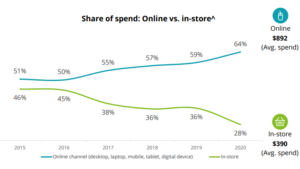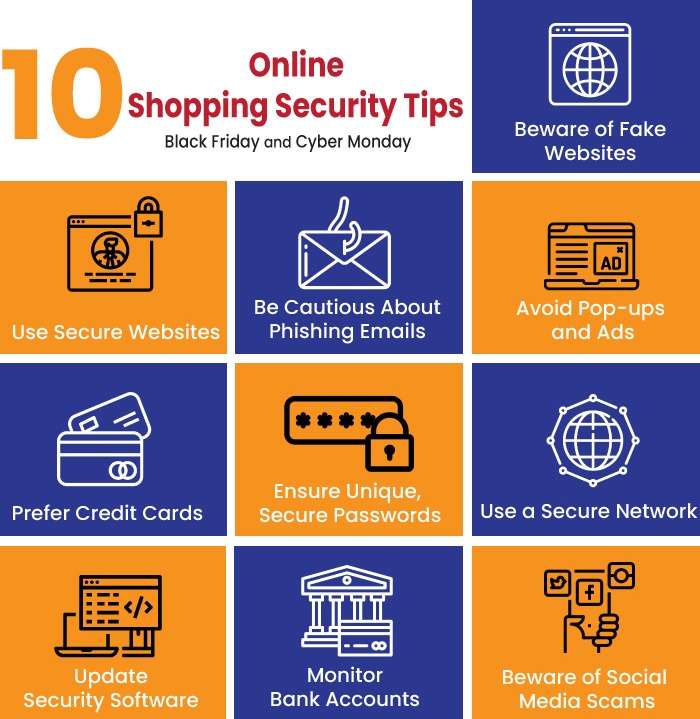Black Friday and Cyber Monday have established themselves as the most crucial holiday shopping dates in the US calendar.
Retailers and shoppers are gearing up to enjoy another festive thanksgiving period (from Thanksgiving Thursday to Cyber Monday). This year, Thanksgiving Day falls on November 26, Black Friday on November 27, and Cyber Monday on November 30.
Although the coronavirus pandemic has altered the holiday traditions this year, shoppers are still intent on spreading happiness and making the most of celebrating at home.
However, COVID-19 anxiety is reshaping how shoppers approach the season. It causes consumers to pull back from in-store shopping, and many do not expect to return until a coronavirus vaccine is developed.
According to Deloitte’s 2020 Holiday Retail Survey,
- 51% of consumers are anxious about shopping in-store due to COVID-19
- 65% prefer shopping online for safety and convenience
- 49% will return to pre-pandemic shopping style once a vaccine is developed
A Glance at Share of Average Holiday Spending: Online Vs In-store:

Unfortunately, the significant rise in demand for online shopping this holiday season provides the perfect opportunity for cybercriminals to launch their online scams.
According to McAfee’s 2020 Holiday Season: State of Today’s Digital e-Shopper Survey, 60% of Americans concerned that cyber-scams became more prevalent during the holiday season. So, it is now more important than ever to ensure we are all vigilant and extra cautious as we indulge in the most wonderful time of the year.
Here are some essential cybersecurity tips to keep you safe from online shopping scams this black friday and cyber monday.
Top 10 Online Shopping Security Tips for Black Friday and Cyber Monday

1) Beware of Fake Websites
Fake or copycat website is the most popular way cybercriminals will deceive online consumers into falling prey for their Black Friday and Cyber Monday scams. They will clone websites to appear close to legitimate sites.
The webpage may contain misspelled links, images may be pixilated, the content will often be sub-standard, and website functions may not work correctly. Before you click on any links, hover the cursor over the link, and make sure that it shows the real destination URL.
2) Use Secure Websites
Before you start online shopping on any website during the thanksgiving period, check whether the site is safe and secure. Hover the cursor over the URL and confirm the authenticity of web address. Look for the padlock symbol in the address bar and ensure that the URL begins with ‘HTTPS://’ or ‘SHTTP://’ rather than ‘HTTP://.’ The ‘S’ indicates that the webpage has been encrypted and secured with an SSL certificate.
3) Be Cautious About Phishing Emails
Emails are among the most popular ways for cybercriminals to gain access to your personal information and financial details. The malicious actors send phishing emails to trick online shoppers into clicking a link that appears to be from a legitimate retailer. But these links take you to a scam site that can steal your login credentials, payment info, or even funds when you try to place an order through them. Rather than clicking email links, shop directly from the retailer’s website.
4) Avoid Pop-ups and Ads
Emails are not the only way for cybercriminals to lure you. Pop-ups and advertisements can be used for spreading malware and viruses. Clicking on these malicious ads could link you straight to a scam site, or you may end up downloading malware on your device.
As it is hard to differentiate a fair deal and a fake, it is best to go directly to the brand’s website to determine if the deal is real.
5) Prefer Credit Cards
It is always recommended to use credit cards instead of debit cards for online shopping as the former offers additional protection. In case you made any fraudulent purchase with your credit card, there is a good chance that your bank will reimburse you promptly.
Major credit card companies, including Mastercard, American Express, Visa, and Discover, provide “zero liability” policies, so you do not need to pay for any fraud.
However, if a malicious actor gains access to your debit card details, they can steal money from your account, and it can be hard to claim the money back.
6) Ensure Unique, Secure Passwords
According to PCI Pal, around 47% of Americans use the same passwords repeatedly. It can often be tempting to use the same password for multiple passwords, but it puts you at a greater risk of exposing your personal information. If a hacker can work out just one password, they can potentially access every account you have.
Thus, it is advised to use unique and strong passwords for every online account. You can use a password manager to generate unique and secure passwords for all your accounts and remember them for you.
7) Use a Secure Network
When shopping online, ensure that you use a secure internet connection, either your phone’s cellular network or a private Wi-Fi connection, to browse the internet.
According to a recent survey by Symantec, 87% of Americans use free public Wi-Fi, and over 60% believe their information is safe on the public internet.
However, public Wi-Fi networks require no authentication to establish a network connection, enabling cybercriminals to gain direct access to devices on the same open network. This allows hackers to steal sensitive information, such as login credentials, identity, and financial details.
8) Update Security Software
Before you start shopping online for the best Black Friday and Cyber Monday deals, ensure that all your security software is up to date. This restricts cybercriminals from gaining access to your device through security vulnerabilities in older and outdated systems.
9) Monitor Bank Accounts
Throughout the holiday season, regularly monitor your bank statements to ensure no unusual transactions on your account. As there will be unprecedented online activity during Black Friday and Cyber Monday, cybercriminals hope that any unusual debits from the shopper’s account will go undetected. The criminals will often start with smaller amounts and go for a larger amount, almost emptying your account.
10) Beware of Social Media Scams
Social media scams have become prevalent on Black Friday and Cyber Monday. Hackers use social media platforms, including Facebook, Instagram, and Twitter, to put malicious posts, and entice online customers to like and share their posts and click notorious links.
In Conclusion:

Despite the increasing threat of cyberattacks and data breaches, there are several ways you can secure yourself online. Staying vigilant and proactive while shopping online this Black Friday and Cyber Monday can help keep your personal information and finances safer. Happy Shopping!!
More Articles:
- Cybersecurity Trends in 2021 and Beyond!
- What Measures Should You Adopt for Managing Insider Threats?
- How Businesses Can Implement ‘Zero Trust Security’?
- 83% Of Large-scale Enterprises Transformed Their Cybersecurity Due To Pandemic!
- Hacker Steals 34 Million User Records from 17 Companies
- Cybersecurity Best Practices to Protect from Cyber Threats

